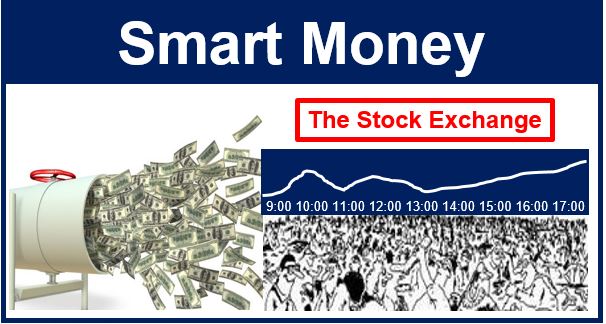Smart Money refers to investments or transactions made by ‘expert’ investors who are said to have a comprehensive understanding of financial markets – they can identify or foresee trends before others.
Smart money also implies a strategic timing of market entry and exit, with ‘expert’ investors not only recognizing early signals of market movements but also knowing the optimal moments to act upon them.
Investors who do not spot or predict investment trends, i.e. those who try to ride the trend after the smart money has already made most of its profit, are called ‘stupid money’ or ‘dumb money’.
Many people believe the whole thing is a myth. They say that wealth managers – people who manage and advise on clients’ portfolios – perform no better (and in a surprising number of cases worse) than the overall stock market’s average trend over any given period.

Smart money can also mean the collective force of big money that can move markets. When it has this meaning, the primary force behind smart money is the central bank.
Smart money in venture capital
In the venture capital world, smart money is an investment term that includes money people invest in a business, plus the time, advice and know how which they put into the company. It is called ‘smart’ because the business receives the investors’ wisdom as well as funds.
In venture capital terminology, when just money is invested without the investors putting in any of their know how or time, it is called ‘dumb money’.
Smart money in gambling
In the betting world, smart money refers to gamblers who know what they are doing and manage to earn a living on their bets. Many use historical mathematical algorithms to decide where to place their wager and how much to bet.
Many gambling websites and individuals claim they have the best smart money system, with some saying their bets are over 90% accurate.
Smart Money Index
The Smart Money Index (SMI), also known as the Smart Money Flow Index, is an indicator of investors’ sentiment. SMI was invented by money manager Don Hays.
The SMI is based on price patterns that develop during the trading day (intra-day price patterns).
Most traders tend to overreact at the start of the trading day because their impulses are driven by overnight news and economic data.
Experienced (smart) investors begin their trading closer to the end of the trading day, after they have had a good look at market performance. The strategy is to bet against what happened in the morning, and follow the evening price trend.
Smart money investors often exhibit disciplined risk management, avoiding emotional decision-making and instead relying on objective, analytical assessments to make their investment choices.
Video explanation
